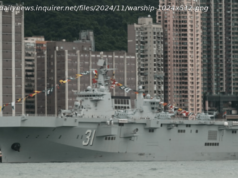Chinese officials summoned the United States ambassador in Beijing to denounce the sanctions that Washington announced this week.
WASHINGTON — Chinese officials have summoned the United States ambassador in Beijing to denounce the United States for imposing economic sanctions this week on a Chinese military organization for buying equipment from Russia, according to Chinese state news reports on Saturday.
The move came as China pressed the United States to withdraw the sanctions .
The sanctions were “a flagrant breach of basic rules of international relations” and “a stark show of hegemonism,” said Wu Qian, a spokesman for the Ministry of Defense, according to the state news agency Xinhua .
The diplomatic dispute adds to rising tensions between the United States and China, the world’s two largest economies.
Foreign Ministry officials raised objections to the United States ambassador, Terry Branstad, according to People’s Daily, the official Communist Party newspaper.
The State Department confirmed on Saturday that Mr. Branstad met with Chinese officials, but declined to comment further.
On Thursday, the State Department said that it was imposing sanctions on the Equipment Development Department of the Chinese Central Military Commission and its top official for “engaging in significant transactions” with a group in the Russian defense sector that is on a list of blacklisted entities.
The transactions involved the purchase of Russian Su-25 combat aircraft and equipment related to the S-400 surface-to-air missile system, the State Department said.
The Chinese received the aircraft in December 2017 and an initial batch of the missile equipment in 2018, the department said. Both were the result of deals negotiated before August 2017 between the Chinese military organization and Rosoboronexport, a state organization that is the main arms exporter of Russia.
Such military cooperation between the countries was normal, and in line with international law, said Mr. Wu, the military spokesman, according to the Xinhua report.
The State Department said it was imposing the sanctions against Russian and Chinese officials for violating a law enacted by the American government last year to punish Iran, North Korea and Russia for what American officials called hostile behavior. In the case of Russia, the act is intended to punish its military actions in Ukraine and Syria and cyberinterference in the American presidential election of 2016, among other things.
Tensions between the United States and China have escalated over a trade war that President Trump and his economic advisers started over the summer. Mr. Trump announced tariffs this week on an additional $200 billion worth of goods from China, prompting China to retaliate by promising to impose similar tariffs on $60 billion worth of goods from the United States. China also canceled trade talks that had been scheduled for next week in Washington.
Relations between the countries have grown strained on other fronts. Trump administration officials have scolded China for not doing enough to pressure North Korea over its nuclear program; criticized what they call Chinese military expansionism in the Pacific and Indian Oceans; and are weighing sanctions against Chinese officials for the repression of ethnic Uighurs in the region of Xinjiang, where up to one million Uighurs are being detained in re-education camps.
As well, American officials are anxious about Chinese influence in Latin America. This month, the State Department recalled its three chiefs of mission in Panama, the Dominican Republic and El Salvador as a rebuke to those nations, which recently chose to drop diplomatic recognition of Taiwan in favor of recognizing China. The United States has recognized China since 1979, but wants the handful of small countries that recognize Taiwan to continue doing so as a hedge against Chinese power.






